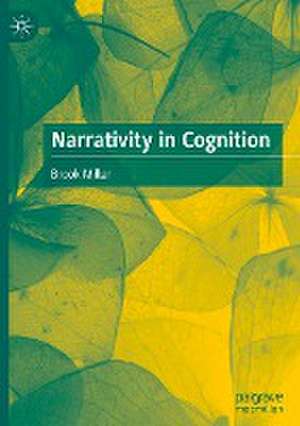Narrativity in Cognition
Autor Brook Milleren Limba Engleză Hardback – 26 noi 2023
This book offers a novel theory of the roles narrative plays in cognition by arguing that we can develop rich interdisciplinary research by thinking of narrative as a form of processing. Narrative processing describes a mode of anticipating, organizing, and simulating experience that is provisional, ongoing, and deeply integrated into how we make sense of what happens and how we figure ourselves into it. Accounts of narrative differ widely between cognitive psychology, contemporary philosophy, and literary studies. As a result, it is difficult to reconcile research about narrative from these disciplines. Yet the questions at stake in this research are often profound. For example, how are experiences organized into meaningful sequences? How do the rich and complex features of a ‘life narrative’ emerge from the ways experience is processed in perception, working memory, and other components of present cognition?
The model of narrative processing proposed in this book complements several influential, emerging theories of cognition, including predictive processing, emotion as a component to cognition, and ecological theories of cognition. The book argues that the role of narrative in higher-order cognition is reciprocally related to the emergent narrative features of lower-order cognition. In doing so, it provides a coherent concept of narrative with the potential to inform research in various disciplines.
The model of narrative processing proposed in this book complements several influential, emerging theories of cognition, including predictive processing, emotion as a component to cognition, and ecological theories of cognition. The book argues that the role of narrative in higher-order cognition is reciprocally related to the emergent narrative features of lower-order cognition. In doing so, it provides a coherent concept of narrative with the potential to inform research in various disciplines.
Preț: 891.48 lei
Preț vechi: 1087.17 lei
-18% Nou
Puncte Express: 1337
Preț estimativ în valută:
170.59€ • 178.47$ • 141.71£
170.59€ • 178.47$ • 141.71£
Carte tipărită la comandă
Livrare economică 03-17 aprilie
Preluare comenzi: 021 569.72.76
Specificații
ISBN-13: 9783031403484
ISBN-10: 3031403487
Pagini: 240
Ilustrații: XIII, 240 p. 9 illus.
Dimensiuni: 148 x 210 mm
Greutate: 0.46 kg
Ediția:1st ed. 2023
Editura: Springer Nature Switzerland
Colecția Palgrave Macmillan
Locul publicării:Cham, Switzerland
ISBN-10: 3031403487
Pagini: 240
Ilustrații: XIII, 240 p. 9 illus.
Dimensiuni: 148 x 210 mm
Greutate: 0.46 kg
Ediția:1st ed. 2023
Editura: Springer Nature Switzerland
Colecția Palgrave Macmillan
Locul publicării:Cham, Switzerland
Cuprins
1 Introduction.- 2 Approaches to Narrative.- 3 Narrativity and Intention.- 4 Narrativity and Reading Narratives.- 5 Cognition: Contemporary Views and Debates.- 6 Events and Weak Narrativity.- 7 Affect and Weak Narrativity.- 8 Narrativity in Higher Order Cognition.- 9 Conclusion.
Notă biografică
Brook Miller works at the Center for Humanities and Digital Research at the University of Central Florida, USA. He is the author of previous books about narrative and numerous articles and conference presentations about cognition, narrative, and literature.
Textul de pe ultima copertă
This book offers a novel theory of the roles narrative plays in cognition by arguing that we can develop rich interdisciplinary research by thinking of narrative as a form of processing. Narrative processing describes a mode of anticipating, organizing, and simulating experience that is provisional, ongoing, and deeply integrated into how we make sense of what happens and how we figure ourselves into it. Accounts of narrative differ widely between cognitive psychology, contemporary philosophy, and literary studies. As a result, it is difficult to reconcile research about narrative from these disciplines. Yet the questions at stake in this research are often profound. For example, how are experiences organized into meaningful sequences? How do the rich and complex features of a ‘life narrative’ emerge from the ways experience is processed in perception, working memory, and other components of present cognition?
The model of narrative processing proposed in this book complements several influential, emerging theories of cognition, including predictive processing, emotion as a component to cognition, and ecological theories of cognition. The book argues that the role of narrative in higher-order cognition is reciprocally related to the emergent narrative features of lower-order cognition. In doing so, it provides a coherent concept of narrative with the potential to inform research in various disciplines.
The model of narrative processing proposed in this book complements several influential, emerging theories of cognition, including predictive processing, emotion as a component to cognition, and ecological theories of cognition. The book argues that the role of narrative in higher-order cognition is reciprocally related to the emergent narrative features of lower-order cognition. In doing so, it provides a coherent concept of narrative with the potential to inform research in various disciplines.
Brook Miller works at the Center for Humanities and Digital Research at the University of Central Florida, USA. He is the author of previous books about narrative and numerous articles and conference presentations about cognition, narrative, and literature.
Caracteristici
Argues for a new view of cognitive narratology based on a process-orientation Engages scholarship in cognitive studies prediction, embodiment, emotion, event segmentation and episodic memory Theorizes how higher order narrative thinking emerges from and informs perceptual cognition
